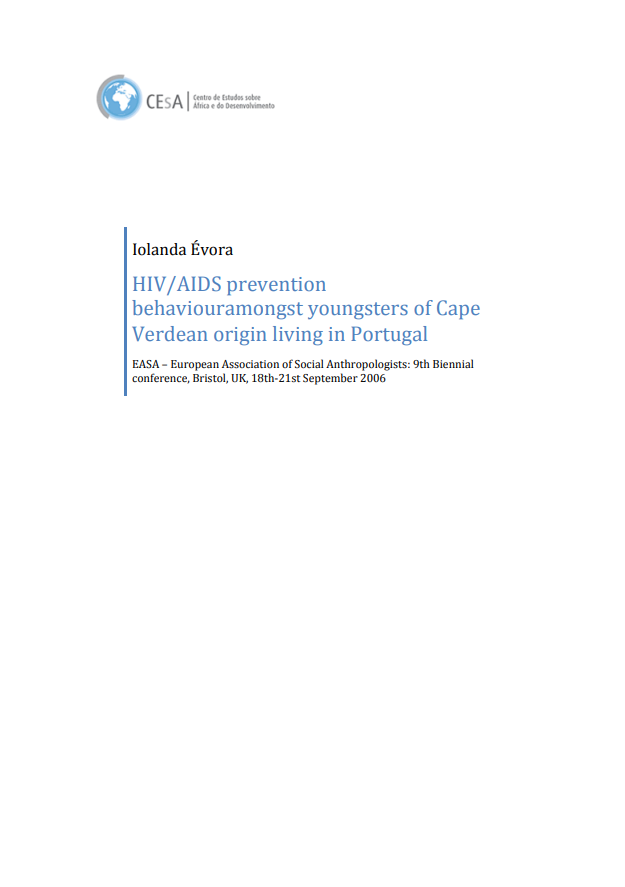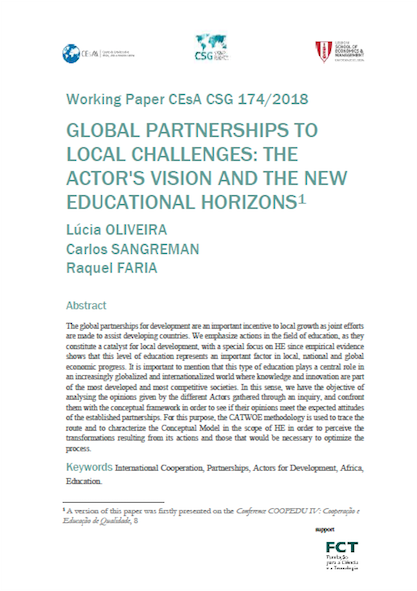Education

HIV/AIDS Prevention Behaviour Amongst Youngsters of Cape Verdean Origin Living in Portugal
Abstract:
This paper deals with the preventive AIDS behaviour of youngsters of Cape Verdean origin living in Lisbon. It focuses on the group practices and representations of AIDS and gender oriented sexual behaviour. Based on an ongoing research project, the paper argues how AIDS has the potential to become another discriminatory factor in a group already racially and socially stigmatized. This research aims to understand the relation between what young people know about HIV/AIDS and their active prevention behaviour. In addition, it explores how the immigration context may interfere in their behaviour and opinions towards HIV/AIDS and in the practices considered the safest ones to adopt. Therefore, this research is amongst those that aim to ground HIV/AIDS health education proposals on a clear understanding of how different populations or groups conceive their own healthcare. For that purpose, we selected a sample of young people from Cape Verdean origin presently living in Portugal, born in or outside of Cape Verde. Both genders were equally present (8 men and 7 women), aged between 16 and 26 and living in council estates, in other words, housing built on council’s urban redevelopment projects to relocate people from the slums. The areas of interest were chosen for presenting a high number of Cape Verdeans or their descendents: Lisbon, the Greater Lisbon and Loulé. We presuppose that belonging to these areas implies a particular social and economical context; for, although debatable, the definition of ‘council relocation housings’ conveys, to a great extent, a social categorization applied by a system of social classification to immigrants in Portugal. Accordingly, we considered eventual repercussions on the youngsters’ social experience and on their material and symbolic existential conditions, upon which rely daily decisions concerning health and prevention. A qualitative methodology of data collection was adopted, to allow an exhaustive explanatory study and the identification of several perceptual and behavioural patterns. Such methodology, developed by Rodrigues (1978,1999), is the most adequate to reach ‘irrational’ content – denomination commonly applied in Social Sciences to factors that “exist, but cannot be apprehended by reason” (Rodrigues, 1999, p.4). As the author refers, it is about reaching “that which cannot be measured, but is worthy of being known”, more specifically, the emotional content and deeper meaning of youth’s explanations regarding HIV/AIDS prevention behaviour. Thorough individual interviews were carried out, aiming to collect a material able to reveal the representations, the type of perception, the explanatory resources used, the justifications produced according to the roles occupied within a certain group, particularly, their position regarding immigration and HIV/AIDS. By using self-examination (free discourse), we were able to identify main areas of interest and concern, their importance, how they interrelate with their life and the surrounding world. Moreover, aiming to identify exactly how the interviewees place the AIDS issue within their life concerns. Intermediary Questions enable us to explore HIV/AIDS issues relevant to the project, though not spontaneously raised by the youngster during the Free Discourse approach. The Socioeconomic Questionnaire enabled an understanding of the life conditions of this group in Portugal, as well as of their family history. Today we shall discuss here the subject of family migration in its different phases and by each individual.
Quotation:
Évora, Iolanda. 2011. “HIV/AIDS prevention behaviour amongst youngsters of Cape Verdean origin living in Portugal”. Comunicação apresentada na EASA – European Association of Social Anthropologists : 9th Biennial Conference, Bristol, United Kingdom.

Working Paper 174/2018: Global Partnerships to Local Challenges: The actor’s vision and the new educational horizons
Abstract:
The global partnerships for development are an important incentive to local growth as joint efforts are made to assist developing countries. In Global Partnerships to Local Challenges: The actor’s vision and the new educational horizons we emphasize actions in the field of education, as they constitute a catalyst for local development, with a special focus on HE since empirical evidence shows that this level of education represents an important factor in local, national and global economic progress. It is important to mention that this type of education plays a central role in an increasingly globalized and internationalized world where knowledge and innovation are part of the most developed and most competitive societies. In this sense, we have the objective of analysing the opinions given by the different Actors gathered through an inquiry, and confront them with the conceptual framework in order to see if their opinions meet the expected attitudes of the established partnerships. For this purpose, the CATWOE methodology is used to trace the route and to characterize the Conceptual Model in the scope of HE in order to perceive the transformations resulting from its actions and those that would be necessary to optimize the process.
Quotation:
Oliveira, Lúcia, Carlos Sangreman e Raquel Faria (2018). “Global partnerships to local challenges: the actor’s vision and the new educational horizons”. Instituto Superior de Economia e Gestão – CEsA/ CSG Documentos de Trabalho nº 174/2018.





